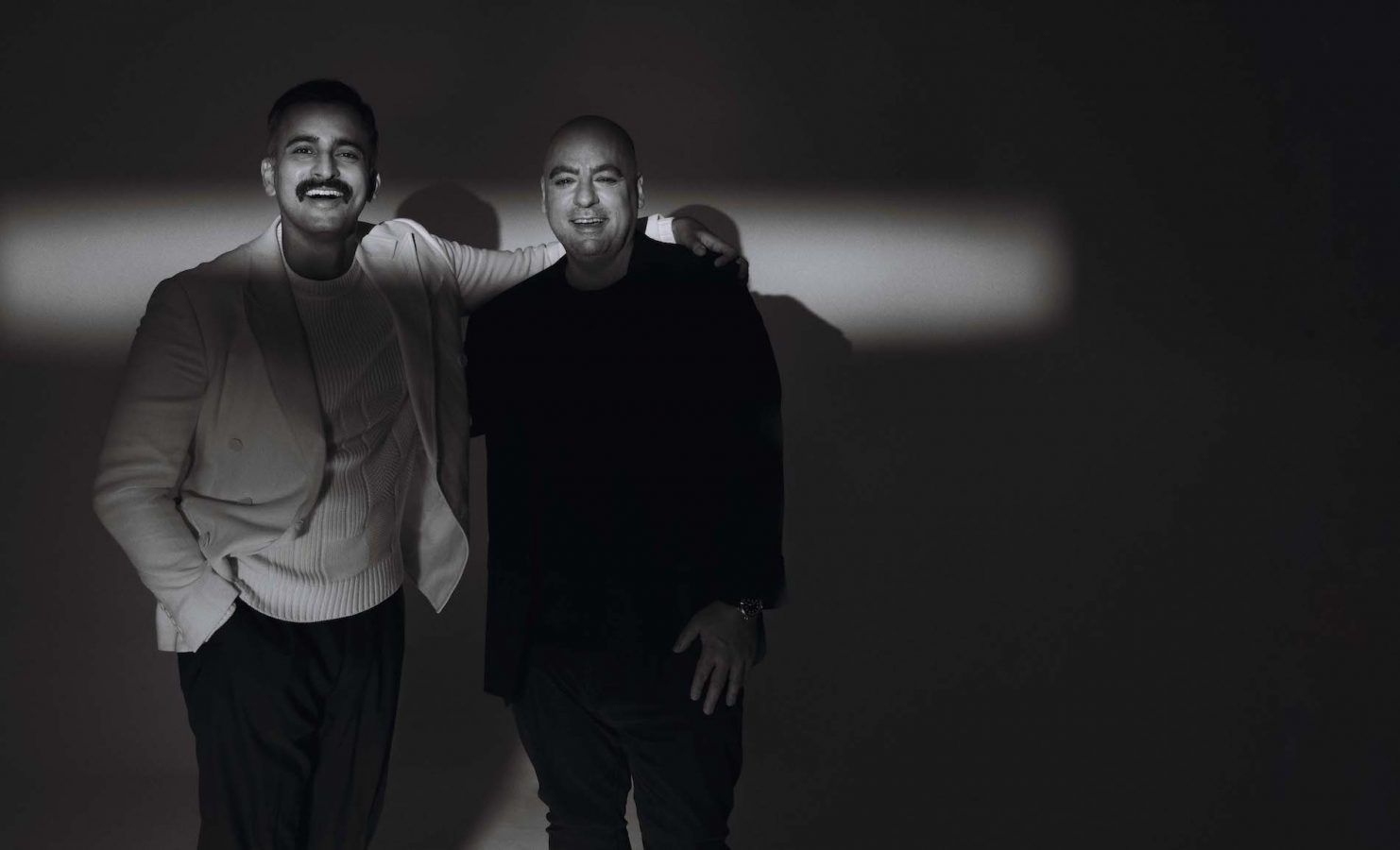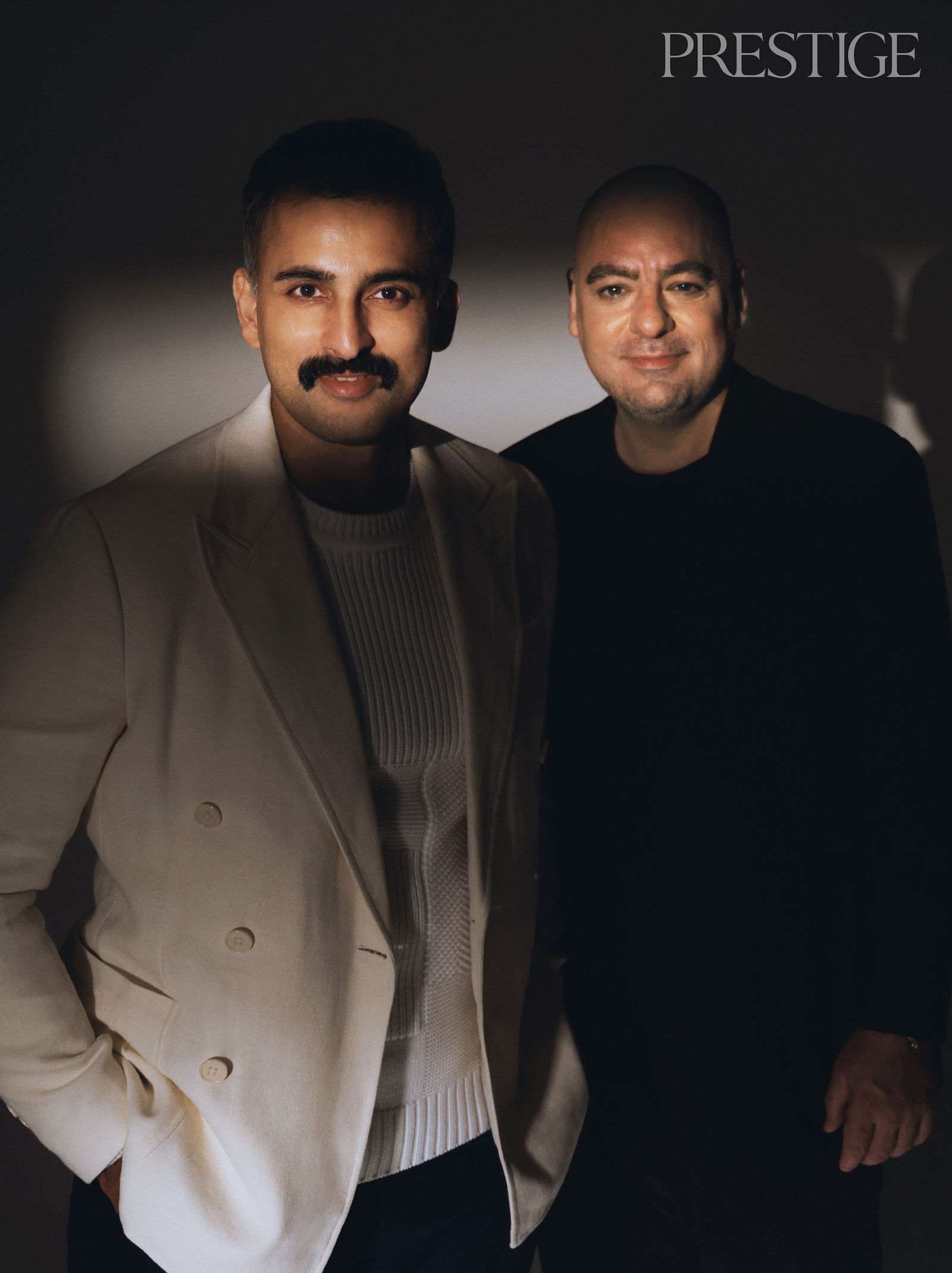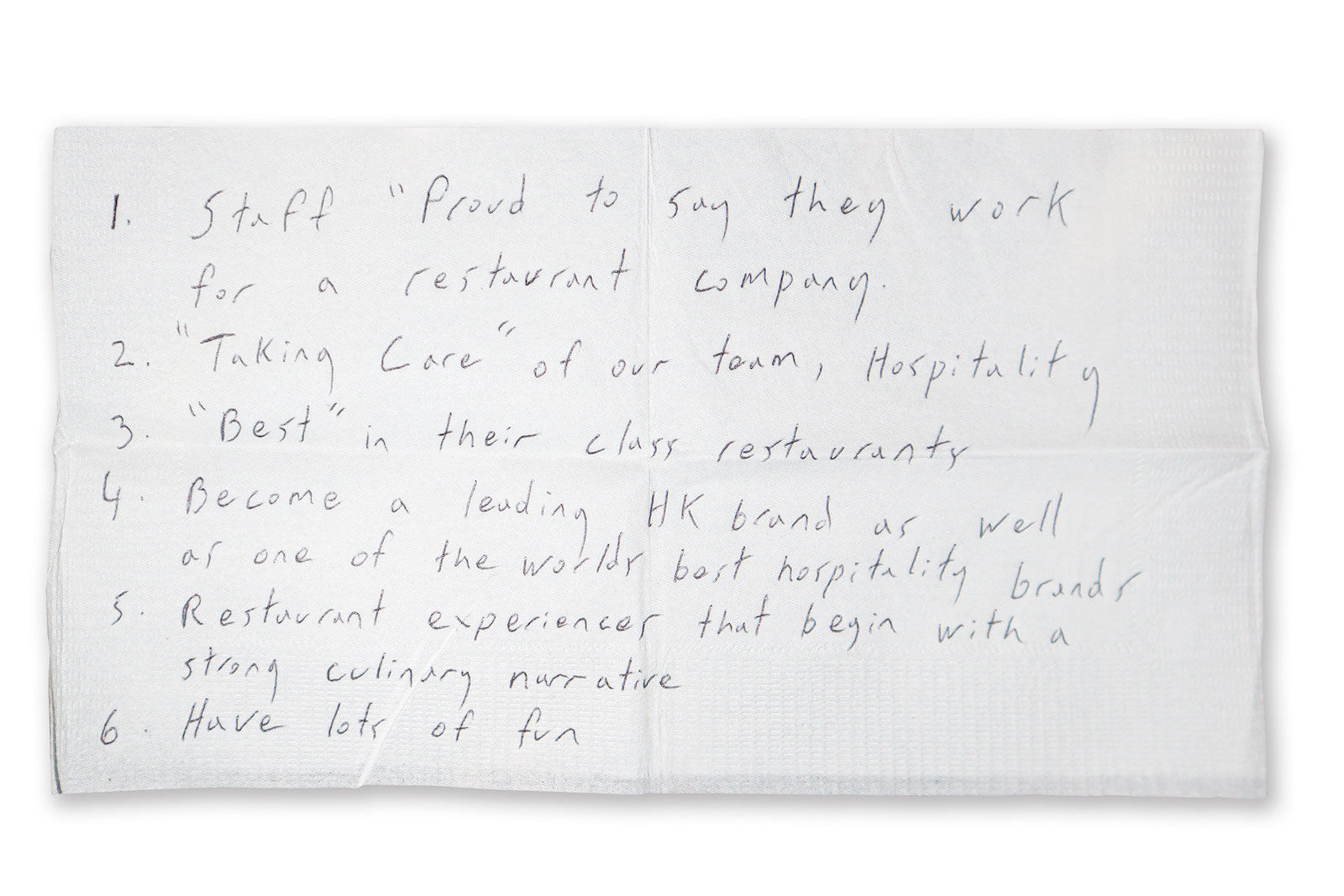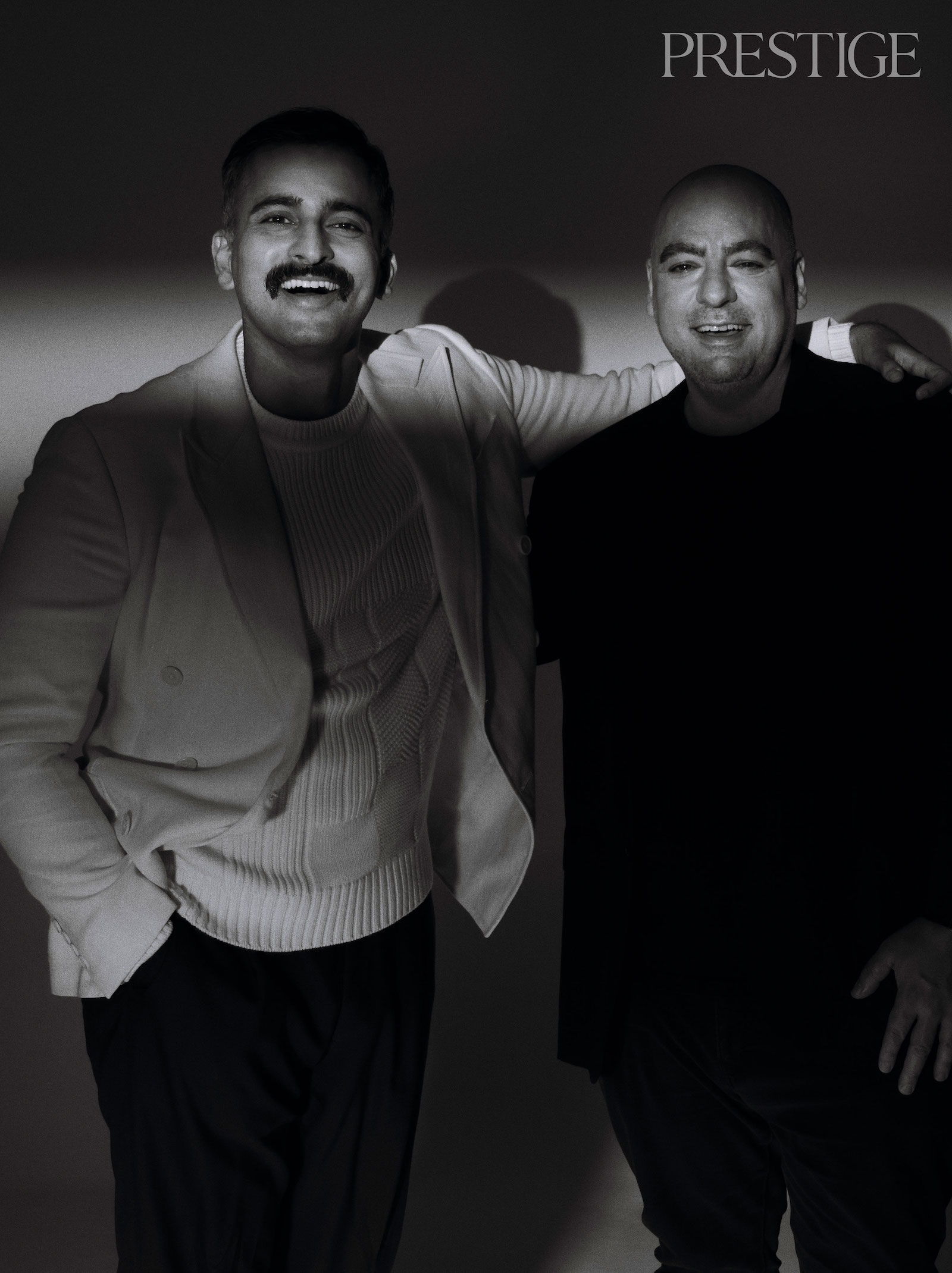Betting On Black: Syed Asim Hussain And Christopher Mark on Black Sheep’s Bid For Greatness


As Syed Asim Hussain and Christopher Mark celebrate a significant anniversary for their Black Sheep venture, they tell us how they came to establish a brand that’s become more than merely a rapidly expanding group of restaurants.
CREATIVE DIRECTION AND STYLING ALVIN GOH
PHOTOGRAPHY ALEXANDER YEUNG
HAIR AGNES YEUNG | MAKE-UP SHAN SHAN
STYLING ASSISTANT ALEX LOONG
PHOTOGRAPHY ASSISTANT CHUNG

When 2019 began, Black Sheep Restaurants was on top of the world. Syed Asim Hussain and Christopher Mark’s restaurant group-turned- hospitality movement had expanded to more than 30 venues in Hong Kong. Hussain had become the youngest restaurateur on the planet to hold two Michelin stars, one for the neo-Parisian concept Belon and the other for New Punjab Club, the first-ever Punjabi restaurant to receive the honour.
Since opening their first restaurant together, the pair were rewriting the rules of Hong Kong F&B and international expansion was firmly in their sights. “We were on the runway and the plane was ready to take off,” says Mark.
You already know what happens next. “Before the social unrest, we’d never had two consecutive months of financial losses, ever. We haven’t had two consecutive months of profits for the last three years,” says Hussain. “Sometimes life’s a funny game.”
When the pandemic brought the whole world to a standstill, Hussain and his team didn’t falter; they sprang into action, first developing what would become a globally lauded playbook for restaurant safety, then offering it freely to the dining community at home and abroad. The playbook was created to save lives – and, for fellow restaurateurs, livelihoods as well.
Two years later, as the rest of the world adjusts to living with Covid, the situation in Hong Kong doesn’t look entirely dissimilar to how it did when the crisis began. Through wave after wave and ever-changing regulations, Hussain and Mark could only rely on a playbook of their own, a set of values their partnership started with 10 years ago.
“I talk a big game when it comes to values,” says Hussain. “One thing that I’m really proud of is that not one single person has been made redundant for financial reasons. I made a decision very early on – if it’s gonna sink, we’re all gonna sink together. And maybe that’s a really stupid business decision, but it’s the decision we made.”
While it may not be the celebration they envisioned – to commemorate a decade of longevity in the high- pressure, high-rent, high-competition business of Hong Kong F&B represents a success by any measure – there’s no shortage of conviction from Hussain or Mark that the very values that got them through the first 10 years will see them through the next, and beyond. To understand why, we’ll have to start at the beginning.

Born and raised in Hong Kong, Hussain was barely a teenager when he began learning the business of hospitality. Home on holiday from boarding school in Pakistan, he and his elder brother Haider were getting ready to take advantage of all the trappings of summer: beach days, getting into trouble with friends, flirting with girls. Their father Pervez, owner of The Mughal Room on Wyndham Street (now the home of New Punjab Club), had a different plan for his sons.
“That summer of ’97 – I was 12, 13 years old – our job was cleaning toilets and collecting garbage from the restaurant and pushing it all the way to this garbage depot in Lan Kwai Fong,” says Hussain, who can still vividly describe his memories of those holidays (and many more that followed). “You’d see other teenagers and think, ‘Why does he hate us so much? This is cruelty!’”
“[My father] used to walk 20 yards behind us just to make sure that one of his staff wasn’t helping – that Haider and I were actually pushing the cart all the way down. It was horrible,” he says with a smile. “I think that was his sort of training.”
As painful as the experience was for Hussain, it instilled in him a passion for work, hard work, that never went away. A talented athlete, he began to see restaurants as another type of team sport. “That immediately made me fall in love with restaurants and hospitality,” he says.
Mark had a different path. His parents divorced while he was young, and he moved in with his mother. Their landlord owned a neighbouring Italian joint that always offered young Chris an open door and a warm meal while his mom worked long hours as a nurse. Meanwhile, trips to Toronto and Vancouver to visit his father would always centre around dining out, whether they were hitting a diner, a Chinese takeout or an upscale restaurant, his dad would be treated like a celebrity.
Things took a turn for the worse in his teenage years, when Mark landed in trouble with the law and spent a year in a juvenile prison. His takeaway from the experience? “The food was really bad,” he says with a laugh. All he wanted after getting out was a nice meal and, after alighting a Greyhound bus on Vancouver Island, he made a beeline for the first restaurant he saw – “the best restaurant in the city”, he tells it – one that would change everything.
“The chef came out and he’s like, ‘Why the fuck is this 16-year-old kid in the dining room?’” says Mark. The two struck up a conversation, Mark told him his story and the chef offered him a waiter’s job on the spot. He found an early mentor in that chef, who eventually encouraged him into the kitchen to expand his understanding of restaurants, just in case he wanted to open one (or a few dozen) of his own someday.
“He was this big cookbook collector; he introduced me to knives and cuisine,” says Mark. “From that point on, I was hooked and I never looked back.”


Although the seeds of hospitality were planted at a young age for both men, they took a little longer to take root for Hussain. After boarding school, he went on to study finance and international relations at Carnegie Mellon University, which landed him a cushy brokerage gig in New York. Life was good: he had a prestigious job, friends, relationships, even a local bar. But there was an itch that his white-collar life just couldn’t scratch, so he packed his things, ignored the puzzled reactions from friends and colleagues and returned home to take on an apprenticeship with the Hong Kong restaurant group Dining Concepts, where he met Mark.
“I didn’t know how long he was gonna last,” says Mark with a grin. Almost a decade older than Hussain, he’d made his way up through kitchens across Japan and Australia before joining the group as executive chef and partner. That summer would be yet another test of resolve for Hussain, a successful finance whiz who’d traded being wined and dined at Daniel and Jean-Georges for shifts at Harbour City’s BLT Burger, where he manned the corporate office by day and the restaurant floor by night.
“I was serving one day and this lady kept snapping her fingers to get my attention. I went over and her kid’s head is in her lap, and she points under the bench – he’d just thrown up. I just kind of froze for a minute,” says Hussain. “I knew I wanted to do this, but it was the start of the universe asking, you know, how bad do you really want it? And then I got down on my hands and knees and I cleaned.”
For a period of 18 months, Hussain would begin his days early and end them late, taking the last Star Ferry home from Tsim Sha Tsui – often emotionally and physically drained from the challenge of juggling both roles, all while working for upper management that left him feeling unsupported and unwelcome in the group. Mark, however, quickly took notice of the young apprentice. “Asim had a very good, intense work ethic – I watched him and I thought, ‘OK, this kid seems a little more serious,’” he says. “So we sat down one night, had dinner together and then we started making a habit of having a glass of wine on the rooftop of Bistecca.”
Bistecca, an Italian steakhouse in the heart of Lan Kwai Fong, is another Dining Concepts property where Hussain would spend shifts during his 18 months with the group. And on that rooftop, the two began to lay the foundations for a new kind of restaurant group, with the values, the philosophies, the “stuff that mattered”, all scrawled on the back of a napkin that Hussain still keeps in a special place. “The crown jewels,” he calls it.

With nothing but those values, sky-high ambitions and relationships they’d built – “by the way, we didn’t have any money,” adds Mark – the two set out to find investors who believed in the vision and a location to nurture it. Timing was not on their side.
“Restaurants were really sort of going through a boom at that time in Hong Kong,” says Hussain. Thus began a gruelling series of disheartening site visits – each recorded in Excel by address, size and so on – all while grinding out 12-hour days inside the restaurant.
“Getting started was really rough,” says Mark. “Everything’s so fragile, right? It’s hard to raise the money until you have a location. And then you need the money to get the location. You have to say, ‘Yeah, I’ve got this,’ even when you don’t have it.”
One morning, 180 entries deep into the sheet, they got an urgent call from their realtor. He’d pulled some strings on a can’t-miss location – they could even check it out before it hit the market. “Drop everything,” he said.
“So we dropped everything and got in a cab,” says Hussain. “We get there and it’s horrible. Right in the middle of the girlie bars. We walked into the 7-Eleven on Johnston Road, picked up a six-pack of Asahi and just started drinking on the street. Ten forty-five in the morning, under the July sun.” The dream couldn’t have felt farther away.


Two-hundred-and-fifty-seven lines down the spreadsheet, another call came. A chef and a restaurant investor had a falling out, and a space was up for grabs on the seventh floor of Wyndham Street’s LKF Tower. It was now or never. Favours were called, promises were made and flights were booked to figure out just exactly how those promises would be kept. In this case, it ended with the duo bringing Boqueria, a Barcelona-style tapas bar, from New York to Hong Kong. A few months later on opening night, bottles of Cava popped, sangria poured and a dream began to take shape.
After a few years of wins and seeing their portfolio expand, bringing Neapolitan pizzeria Motorino (albeit by way of Brooklyn) to Hong Kong and launching their first original concept, the Vietnamese bia hoi shop Chôm Chôm, the pair realised their fledgling empire needed a name – if nothing else, so landlords and suppliers would know who they were dealing with.
“We were really an anti-restaurant group,” says Hussain. “It was corny. We didn’t want to be those people who – we do this now [laughs] – put all our logos on a page and say, you know, this is us.” Hussain came up with the name “Black Sheep”, but Mark worried it would come with too many negative connotations. They were just getting started, after all.
“The lovely thing about Chris – and I think it’s what makes him such a good father – is he’ll never say ‘no’ to me; instead, he’ll say, ‘That’s interesting, why do you think that?” says Hussain. “But we wanted something that declared that we’re not going to play by your rules. We’re not going to follow convention. To me, that was Black Sheep.”
“Getting started was really rough … It’s hard to raise the money until you have a location. And then you need the money to get the location. You have to say, ‘Yeah, I’ve got this,’ even when you don’t have it.”
Christopher Mark
“We don’t normally build consensus,” says Mark. “If we’ve hit a bottleneck, we let the person that feels more passionately decide. Then they have to own the results.” Hussain’s passion won out, and the results speak for themselves: The group counts more than 30 restaurants – Black Sheep calls them “stories” – in its portfolio, from overseas imports like Carbone and Messina, to original concepts like Ho Lee Fook, Crown Super Deluxe and Buenos Aires Polo Club, which took over the original location of Boqueria.
It won’t be long until they add another story, one unlike anything else in town: The Magistracy, set to open in Tai Kwun this autumn, will usher in a series of different concepts, including a venue inspired by timeless London restaurants and a semi-secret rum bar, to multiple floors inside a historical building in Hong Kong’s former Central Police Station.
It’s a testament to how far they’ve come and belief in their team that they’d even attempt such a project – especially given the circumstances of the last few years. “There aren’t many people in town that could do this even if they wanted to,” says Mark. “We can, because we have these amazing people around us that look after all sorts of different aspects of the business. But even we couldn’t have done this project five years ago; we just wouldn’t have had the capabilities.”
The team is everything to Black Sheep. It’s why the founders suffered the financial blow so their staff wouldn’t have to. It’s why they spared over HK$5million (and plenty of extra vacation days) to send colleagues home who hadn’t seen their families in far too long. It’s why universal healthcare is freely available to all staffers, with greater companywide mental health initiatives currently in development. It’s why for one day each year, they shut off all the lights in all of their restaurants, bring everyone to the beach for a team party and fete them for the incredible work they do. It’s why so many of those staff who were there at the beginning are still there today.
“There are people now on the team that are more Black Sheep than us,” says Hussain. They’ve seen it all: the ups, the downs, the wins, the losses; things that have made the group’s bonds stronger than iron – along with Hussain and Mark’s commitment, win or lose, to those who stay.
“I’ve always said you’ve got to be a little bit broken to do this thing, to be in this industry,” says Hussain, who credits his father (“a prolific entrepreneur, but maybe the world’s worst restaurateur”) and those 18 months at Dining Concepts for teaching him exactly what he wanted – and didn’t want – his version of that to be.
Not to say there haven’t been ups and downs, even for the two guys who started it. “For the last 10 years we’ve spent 12 hours a day together; I don’t think I’ve ever spent this amount of time in my life with anyone,” says Hussain with a laugh. “When we were opening Ho Lee Fook, we had a few days when we weren’t talking. And at the opening party, Chris said to me – I don’t know why this was your solution – ‘Hey, do you just wanna meet in the back alley and hit each other?’”
“It sounded like a really good idea,” says Mark. “So we walked out there into the alley,” says Hussain. “And then we just hugged. Told each other we love each other. Got back to work.”

Hussain and Mark are both fully aware that this hyper-competitive, playing-for-keeps mentality may have cost them a few friends along the way. Are there regrets? Of course. Mistakes? Definitely. But at the same time, they also feel they did what was necessary to survive. “When we were starting out, there were some forces working against us, and we had to be kind of tough out of the gate,” says Mark. “If we didn’t show our teeth from time to time, we wouldn’t have had a chance to grow.”
Hussain agrees. “We had a little bit of edginess in the early days; we also had a lot of anguish and angst, which I think is a thing of the past. What’s still there is intensity. If we didn’t have it, this stuff wouldn’t feel, taste, walk, talk the way it does.”
That intensity will always be a part of the Black Sheep ethos. It’s never more clear than in what Hussain calls his team’s “maniacal obsession” with hospitality, which you feel from the moment you step into any of the group’s venues. He also acknowledges that, perhaps, that dedication to what’s happening inside their own walls has disconnected them a bit from what’s outside. But it hasn’t stopped them from always being open to offer guidance and lessons learned from their own ups and downs – for those who are willing to seek it.
After all, a win for Hong Kong is a win for Black Sheep, too.
“I wish Hong Kong got some of the recognition it deserves – and not just us. There’s so much talent in the city and people doing great things,” says Mark. “I guess because we’re not an English media centre, I have to read about some guy in New York or LA who got a tattoo and made a beet salad, and it’s like, this guy is a gift to humanity. We’re still proving ourselves here every fucking day.”
Someone recently accused the group of not championing their sustainability cause. Hussain readily admits they’re right. “There’s responsibility on us to do more, and we will. That comes with the success we’ve had, and I’m learning, too. But right now, we’ve been pummelled and we’re just trying to survive,” he says.
“For the last 10 years we’ve spent 12 hours a day together; I don’t think I’ve ever spent this amount of time in my life with anyone.”
Syed Asim Hussain
Survival, taking care of their herd, remains paramount. Maintaining a payroll of HK$25 million each month, without profits and without layoffs, feels like an unfathomable concept. But that’s where those values come in, because Hussain and Mark are betting on something bigger than margins – they’re betting on their people. To hear them tell it, it’s a bet they’ve already won.
“We did it with our integrity, with our personnel, with our partners, with our restaurants – there are definitely some scars – but I think we learned things about ourselves at different times that we just didn’t know,” says Mark.
“I think we’ve always suspected we’re made of good stuff, that we have integrity, that we fight for our people, we stand for the right things,” says Hussain. “I think this era sort of allowed us to demonstrate that. So I’m really proud. And you know, we’ve survived.”
So where does Black Sheep go from here? “I see us doing weird, wild and wonderful things. And I know a lot of them are not gonna work out,” says Hussain, laughing. “I’m still working on my angst.”
As a postscript, he shares a page out of the notebook he carries, a poem he inscribed by CP Cavafy, “Ithaka”.
As you set out for Ithaka
hope your road is a long one,
full of adventure, full of discovery.
Laistrygonians, Cyclops,
angry Poseidon – don’t be afraid of them:
you’ll never find things like that on your way
as long as you keep your thoughts raised high,
as long as a rare excitement
stirs your spirit and your body.
Laistrygonians, Cyclops,
wild Poseidon – you won’t encounter them
unless you bring them along inside your soul,
Unless your soul sets them up in front of you.
Hope your road is a long one.
May there be many summer mornings when,
with what pleasure, what joy,
you enter harbours you’re seeing for the first time;
may you stop at Phoenician trading stations
to buy fine things,
mother-of-pearl and coral, amber and ebony,
sensual perfume of every kind –
as many sensual perfumes as you can;
and may you visit many Egyptian cities
to learn and go on learning from their scholars.
Keep Ithaka always in your mind.
Arriving there is what you’re destined for.
But don’t hurry the journey at all.
Better if it lasts for years,
so you’re old by the time you reach the island,
wealthy with all you’ve gained on the way,
not expecting Ithaka to make you rich.
Ithaka gave you the marvellous journey.
Without her you wouldn’t have set out.
She has nothing left to give you now.
And if you find her poor, Ithaka won’t have fooled you.
Wise as you will have become, so full of experience,
you’ll have understood by then what these Ithakas mean.